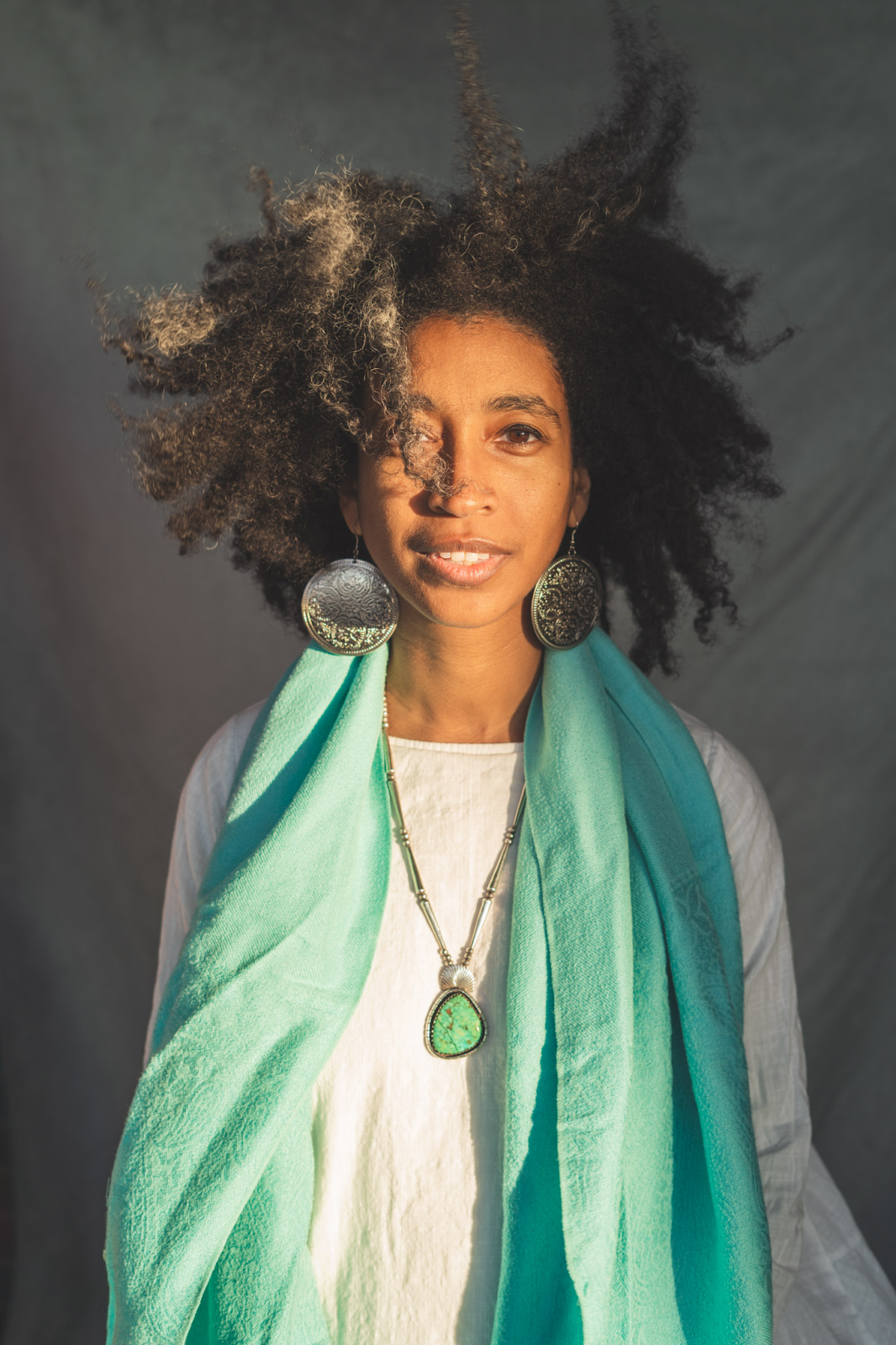

Alexis Gumbs poses for a portrait. Photo by Sufia Ikbal-Doucet.
Tuesday, April 2, 2024
By Lucy Marques
At the beginning of high school, Durham-based writer Alexis Pauline Gumbs read “Their Eyes Were Watching God” by Zora Neale Hurston, for the first time.
As they were reading the coming-of-age story, Gumbs was the same age as the protagonist, Janie. They said they were so moved by Hurston’s writing that they could feel Janie’s experiences throughout the story.
“I was like, ‘How amazing is that? I’m never going to meet Zora Neale Hurston, she passed away a long time before I was born, yet because she wrote this in the way that she wrote it, she’s having an impact on me right now,’” she said.
Gumbs, who is renowned for her Black Queer feminist scholarship, said reading “Their Eyes Were Watching God” was when she understood the power of words, and knew she would pursue a career in writing.
When Gumbs was growing up, her dad introduced her to books on Malcolm X, the Black Panthers and Pan-Africanism. She also read books that her mom kept around the house by Black women writers. Their family’s identities as Afro-Caribbean, African American and Afro-Indigenous people led Gumbs into more reading and research.
Gumbs initially thought she would major in journalism in college, but ultimately decided on a major in American Studies because it was more interdisciplinary.
“I think a lot about history, obviously, I think a lot about literature,” she said. “I definitely still identify as a writer, and majoring in American Studies really gave me the space to, without actually creating my own major, combine those things that I really cared about.”
Gumbs was in the same position when she decided to apply to graduate school. She ultimately enrolled in the English graduate program at Duke University for the same reason; it provided her with an interdisciplinary experience.
Gumbs’ friend Courtney Reid-Eaton, an independent curator and visual artist, said Gumbs is both an artist and a scholar. Reid-Eaton said that for her book “Undrowned,” Gumbs did extensive research on marine mammals and wrote poetry about how those mammals relate to blackness.
“She moves through the world with the intention of being the whole person that she is,” Reid-Eaton said. “She’s not trying to break herself up into little disciplines.”
Gumbs said her poetic trilogy of published works, which consist of “Spill” “M Archive,” and “Dub,” all engage particular theories that are important to her. Those books, she said, create a ceremony that people can participate in.
“My goal is for people, the whole time they’re reading, to be like ‘this is me,’” Gumbs said.
She said that people who have read the trilogy have told her they have felt creatively inspired, creating anything from dances and quilts to tarot decks.
Antonia Randolph, a Jonathan M. Hess term assistant professor of American studies at UNC, said Gumbs’ writing itself is a challenge to academia. Her published trilogy, Randolph said, is not just meant to be read as a collection of arguments but also with an attention to the poetic language.
Gumbs added that academic work can sometimes contain a lot of jargon, which is a barrier for some people who want to engage with it. They said they always want their work to feel open, and for readers to feel invited and loved by the work.
Despite holding a PhD, Gumbs considers herself a community-accountable intellectual.
“There needs to be a point of entry for anybody, especially any Black person, that picks up her books, but any person that picks up her books, she wants it to be accessible to you,” Reid-Eaton said. “Because if your path is to be a queer Black feminists love evangelist, people need to find you and be able to fall in love with you and your mind.”
Randolph said that Gumbs is part of a tradition of Black feminist scholars who work outside of the channels of academia. It can be difficult for their work to be regarded if they are not supported directly by an institution, she said.
“But she’s been uniquely able to affect the center even though she has positioned herself and chosen to be outside of those formal channels,” Randolph said.
Beyond her work researching and reading, it is important for Gumbs to commune and organize with those with shared identities.
Gumbs said that her community work commitments, especially her work with Spirit House, a multi-generational Black-women led organizing group, have shaped her decision to stay in Durham, rather than accepting teaching positions at other universities.
Wherever there is Black queer troublemaking and Black queer joy in Durham, Gumbs can be found there, said Danielle Purifoy, an assistant professor of geography and environment at UNC.
“Once you are a person that is a part of Alexis’ orbit, you are never quite out of it,” she said.
Edited by Nia Satterfield Brown
Edited by Margaux Hunter